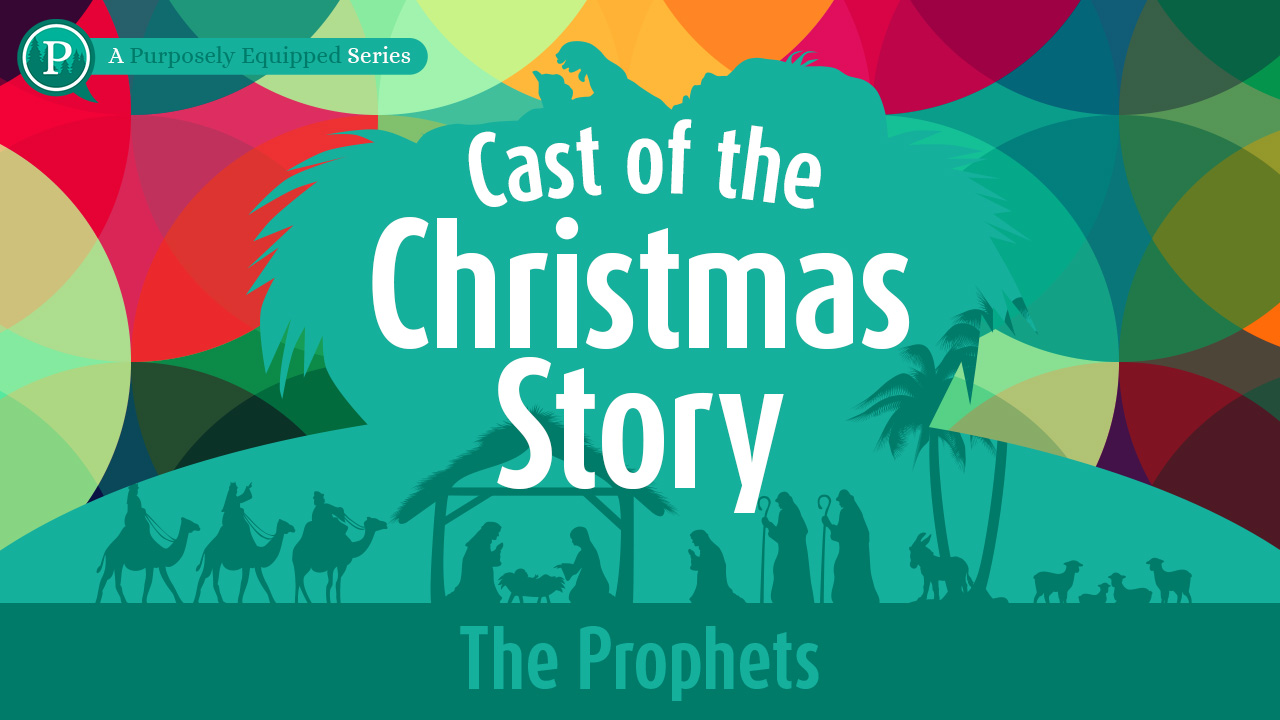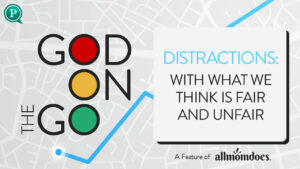Callie Walchenbach from King’s Schools dives into The Prophets today as we look at this small mention in the Christmas story. First, we’ll unpack what a prophet is and the role of a prophet. There is such a story here of God’s patience with us. Jesus fulfilled over 300 prophecies. Callie breaks down the prophecy in Micah as we relate this to the Christmas story and our own story today as we ask the question “Is faithfulness worth it?”
Special thanks to World Concern Global Gift Guide, for bringing us the Cast of the Christmas Story!
Show Notes:
- Find more about King’s Schools
- World Concern Global Gift Guide
Transcription:
Purposely. Your life, God’s purpose. Listen at onpurposely.com.
Mark Holland:
The cast of the Christmas story series is sponsored by World Concern and the Global Gift Guide. Find out more at globalgiftguide.org.
Speaker 1:
The cast of the Christmas story.
Mark Holland:
And we continue at our look of the cast of the Christmas story in these podcasts in the Christmas season right now. And we have a wonderful guest this time. Her name is Callie Walshenbach. Didn’t used to be that though. Recently married. Congratulations.
Callie Walshenbach:
Thank you. Thank you.
Mark Holland:
As we’re recording this, actually, you have a different maiden name. And what was that?
Callie Walshenbach:
Callie Wright.
Mark Holland:
Callie Wright and Callie Walshenbach now, in first month or so of marriage. We know it is a blessed time for you. Maybe you’re connecting even more so than ever with … But you’re not with child yet, are you?
Callie Walshenbach:
Not yet.
Mark Holland:
But of course the Christmas story is about young people. Now you sound young. How young are you?
Callie Walshenbach:
I am 22, almost 23.
Mark Holland:
Okay. I think you’re the youngest person we’ve had involved with this. What brought you here? What do you do here? You actually work with King Schools?
Callie Walshenbach:
I do. I work at King Schools. I teach half the time and assist our campus pastor doing spiritual life and discipleship. So just a gift to be with students and disciple and mentor them in various ways.
Mark Holland:
And you just came through Northwest College too?
Callie Walshenbach:
Yep. Graduated from Northwest University and then did my masters at Liberty University.
Mark Holland:
Already a masters.
Callie Walshenbach:
Oh yeah.
Mark Holland:
In what subjects?
Callie Walshenbach:
Undergrad was business with a minor in ministry and masters is in Christian apologetics.
Mark Holland:
All right.
Callie Walshenbach:
Yeah.
Mark Holland:
Okay. We need you with this generation. They’re pretty messed up.
Callie Walshenbach:
We’re going to get them back on track.
Mark Holland:
We’re get them back on track. I kind of told you before we started recording this, and I’m sometimes kind of don’t feel very hopeful about your generation. They seem to have been completely brainwashed at universities, even at Christian universities sometimes. I know Liberty is a great school, but you told me there is reason for hope.
Callie Walshenbach:
There is reason for hope. There’s a lot of people who love the Lord, fear the Lord. If not hope in this generation, we’ve got hope in the Lord.
Mark Holland:
Hope in the Lord. But it does seem to be getting darker, lots of strange ideas that kids are being indoctrinated with now, but you’ve got a degree in Christian apologetics. And what would you say for people who have kids or grandkids, is there a certain key that you’ve found to reaching this younger generation? What are they looking for?
Callie Walshenbach:
They’re looking for someone to tell them the truth and they’re looking to be in relationship and to have just really meaningful relationship. And I think the best thing we as Christians can do is Eugene Peterson, long obedience in the same direction and just stay faithful.
Abide with him, be fervent in prayer and just walk alongside Gen Z is what we’re talking about and not lose hope on them because God’s got a great plan, a mighty plan, and that starts with us being faithful to him.
Mark Holland:
Okay. Well that is hopeful. That fills me with a lot of hope. And before we recorded you talk to me quite a bit and I’m much more hopeful now.
Callie Walshenbach:
Good.
Mark Holland:
Well, this is a season of hope, obviously. The Christmas story, young people who followed the Lord and were obedient even though it was very strange what they were being asked to do by the Holy Spirit.
And you have been assigned kind of an obscure reference. You are talking to us today about the prophets. There’s just kind of a toss-off line about the prophets. So tell us a little bit about the prophets.
Callie Walshenbach:
Yeah, so we see that 700 years before Christ was born in Bethlehem, we have Micah who’s a prophet in Judah. And just a quick reminder is that after the war in Israel, the nation splits into two kingdoms, Israel and Judah. Micah lived in Judah, but both nations had been living in violation of their covenant with the Lord.
And I think to properly have this discussion, we have to have a correct understanding of what a prophet is. And I think our twenty-first century mind understands a prophet to be a fortune teller or a magician or fill in the blank with something mysterious.
But a prophet is someone who sees the world as it is, which is broken, evil, completely wrecked by sin. And seeing this they call the world to what it should be, which is righteous and just. They’re only future tellers, I say that with quotes, in the sense that they know the future is heaven and they call it down to earth, which echoes the prayer we see in Matthew six, your kingdom come, your will be done on earth as it is in heaven.
So we don’t need prophets to tell us about future events, although we do see this in the Old Testament. We need prophets to communicate the heart of God to us so that we can know if we’re in alignment with his will.
And I think Micah puts it really well with his role as prophet in chapter three, verse eight, he says, “As for me, I’m filled with the power by the Spirit of the Lord with justice and courage to proclaim to Jacob his rebellion, and to Israel his sin.”
So he knows that it’s only by the power of the Spirit that he’s able to communicate these things. And I think that’s going to be our best understanding of what a prophet is.
Mark Holland:
What’s the difference between a prophet and a preacher?
Callie Walshenbach:
I think a preacher is going to communicate the word of the Lord like the Bible and interpret that and apply it for people listening. And a prophet understands the heart of God, the will of God, and calls that out.
And they have oftentimes prophets have a deep sense of right and wrong and black and white, and they’re able to call that out. And I think we even have prophetic voices today who say, “Hey, this is so far-”
Mark Holland:
Understand the times.
Callie Walshenbach:
For sure. This is so far from the heart of God. Let’s get back on track. And those voices are really helpful. And for Micah, his message is of judgment and of restoration. And among all of the Old Testament prophets, he’s actually the most vocal in his demands for justice.
He preached that true authentic faith results in practical holiness and social justice, which sometimes has a bad rap in Christian communities, but I’ll get to that. But I was reading in Matthew just the other day, and he tells the Pharisees the kingdom of God’s going to be stripped from you because you don’t bear any fruit.
And from Old Testament to New Testament, we see that God’s concerned with our hearts, but also how we live. And we see that in both the Old Testament and the new. But he also has a view towards the ultimate reign of the Messiah on earth.
So in Micah’s life, he witnesses unlawful seizure of fields, theft, exploitation of women and children, corrupt leadership, unethical business, violence, bribery. So kind of an interesting note that he was so focused on justice because of what he saw. What he saw is what he was so passionate about.
So he sees how wrecked Judah is by sin and communicates on behalf of God that it’s wrong, that it’s contrary to its will and that God’s protection is no longer going to be with them. So for me, I just see God’s patience here is he’s sending messages, he’s sending signs, he’s sending people to encourage them to be faithful, yet they still don’t listen.
And I think the God of the Old Testament can get a bad rap for being angry or being judgmental or harsh, while the God of the New Testament is loving and fun. And that just could not be further from the truth because we know that the God of Genesis is the same God of the book of Revelation and what a gift it is to serve a God that is consistent and constant and sovereign.
Mark Holland:
Does Micah talk about the Messiah at all? I can’t remember if he’s a messianic prophet at all.
Callie Walshenbach:
He does. I’m just about to get there actually.
Mark Holland:
Okay. Sorry. I interrupted. Okay.
Callie Walshenbach:
So reading the Old Testament shows me how important relationship and holiness is to God so badly that he’s sending prophets that are wanting to communicate his will to them. So what does all of this have to do with the Christmas story? Great question.
Micah has a prophecy in chapter five, verse two. He says, “But you, Bethlehem, though you are small among the clans of Judah, out of you will come from me, one who will be ruler of over Israel, whose origins are from old, from ancient times.”
So when I was asked to share about the prophets, immediately overwhelmed because there’s so many prophecies, so many that Jesus fulfilled. Over 300 and that’s not even including the types, how Adam is a type of Christ. So I’m like, where am I going to start? And Micah, he stuck out to me. And he lived in a time where good is evil and evil is good and where it seemed that no one was following the Lord, yet he still remains faithful.
And despite all that, he offers hope in the coming Messiah. And the world today is not the same as Micah, but the contexts feel similar in that today good feels like it’s evil and evil feels like it’s good. And I often question is faithfulness worth it? And the prophet Micah is such a reminder that faithfulness will never return void.
Mark Holland:
Is Micah the last book of the Old Testament? I can’t remember.
Callie Walshenbach:
No. Malachi.
Mark Holland:
Malachi. Okay. I get those two M’s mixed up there. And Malachi also I think has some prophetic Messianic prophecies in it too. There’s many of the Old Testament books, like Isaiah has got a ton of them.
Callie Walshenbach:
Isaiah has a ton and Isaiah and Micah actually lived during the same time. And Isaiah was a prophet to the kingdom of Israel. So Micah’s not as well known as him, but they actually lived in the same time, which is pretty interesting.
Mark Holland:
Just archeologically, Isaiah, it’s interesting that that’s one of the Dead Sea Scrolls one that they found a real parchment and large sections of that book in particular, and he’s like the most messianic of the prophets, and that is the one that was preserved for history. So Jesus was on the way and they were looking for him.
Callie Walshenbach:
He was, yeah. So the simplicity of Micah just being so faithful in a world that was so far from it was such an encouragement to me. So I thought, I’m going to focus on him. So he again prophesied that the ruler of Israel was going to come from Bethlehem. And we know that Jesus was born in Bethlehem and 700 years prior to his birth, Micah tells of where it’s going to be. Now, I don’t think-
Mark Holland:
Oh, it was 700 years before.
Callie Walshenbach:
700 years before.
Mark Holland:
Wow. Okay.
Callie Walshenbach:
Yeah. So I don’t think this speaks to how great Micah is, but how great God is. Right? That 700 years before Jesus is born, God has a plan of restoration and of redemption for the world. Judah’s rebellion did not fluster him or cause him to panic because his saving grace was already in motion.
And the rebellion of the world today does not fluster him or surprise him because he’s sovereign and he’s good and he’s true. And that is my comfort when the world feels out of order.
Mark Holland:
So it sounds like he really, I mean he was into judgment and like you say, justice and the judgment aspect. Do you think Micah saw that the Messiah was going to be a suffering Messiah?
Did any of them other than maybe Isaiah realize that Jesus was going to come a first time and a second time, kind of the different roles that Jesus … It didn’t seem like anybody was looking for the suffering Messiah.
Callie Walshenbach:
Yeah, I don’t think anyone was. I think they’re looking for a ruler with a crown [inaudible 00:11:22] and an iron fist.
Mark Holland:
Make everything right.
Callie Walshenbach:
Yeah. I don’t think anyone knew how much of a servant Jesus would be.
Mark Holland:
But we need the first coming because getting ready for the second coming now at this point that we’re all living and he is going to be setting everything a right.
Callie Walshenbach:
Yeah.
Mark Holland:
And he is going to be the one who comes to judge the world.
Callie Walshenbach:
Yeah.
Mark Holland:
And we need to be ready for that second coming now.
Callie Walshenbach:
Yeah. For sure. And I think Micah speaks to that, and I can’t help but think what a gift it is that a man who was walking faithfully centuries before Jesus plays a role in the Gospels and plays a role in our discussion today. And the Christmas story would be different if it had not been for Micah.
And what an encouragement that God uses all the parts of our story to write his greater story, and that’s the God we get to serve, which is such a gift. And I think practically this can be applied by using one of Micah’s most known verses, Micah chapter six, verse eight.
Mark Holland:
Yeah. There’s a song even I remember. It might be a little before your time, but Oh, what’s the verse again? (singing)
Callie Walshenbach:
Yes.
Mark Holland:
(singing)
Callie Walshenbach:
Wow. I don’t even know if I need to read the verse anymore.
Mark Holland:
Well, that’s how you memorize Scripture was with songs a long time. Certainly.
Callie Walshenbach:
Yeah. So like you just said, he says, “Mankind, he has told you what is good and what the Lord requires of you. To act justly, to love mercy, and to walk humbly with your God.”
Mark Holland:
Praise the Lord, Maranatha singers. Maranatha music.
Callie Walshenbach:
So God wants his people to fulfill those three divine characteristics that we would act justly and pursue the highest good for others, that we would love and delight and mercy, and that we would walk humbly with God. And Charles Spurgeon gives an excellent sermon on walking humbly.
Mark Holland:
Wow. You’re just throwing out all the hits.
Callie Walshenbach:
Oh yeah. The Prince of Preachers.
Mark Holland:
Okay. All right.
Callie Walshenbach:
And he says that walking humbly-
Mark Holland:
Again, I tell you folks, this gal gives me hope about Gen Z.
Callie Walshenbach:
He says that walking humbly with God is actually indicative of the highest forms of character. And he says that only through faith in Christ does a man learn to do righteously and to love mercy and to walk humbly and only by the power of the Holy Spirit sanctifying us can we do those.
So my prayer is that in this Christmas season, we would recognize the power of faithful obedience like the prophet Micah, that we would rest in God’s sovereignty and that we would understand that the will of God is always greater than our own.
Mark Holland:
Yeah. Well, for people who are listening today and are concerned about the younger generation, concerned about some of these issues and how they are fitting into the Christmas story for today, maybe very encouraged by the voice of Callie Walshenbach.
I’ve been asking different people who’ve participated in this Callie to pray for people who are listening. So maybe pray for parents who are concerned about young people, their kids, grandkids, maybe a young person listening to this podcast, looking for answers, looking for the truth.
You say they’re out there, they are looking, they want to hear the truth. So why don’t you pray for these different people?
Callie Walshenbach:
Yeah, I would love to.
Lord, thank you that you’re sovereign. Thank you that 700 years before you sent your son, you already had the plan in motion. And that we never have to fear at the state of the world because you still have that plan in motion and we can trust and rely on your sovereignty and your goodness.
And I just pray that in this Christmas season, we would recognize that being faithful will never return void. That we would recognize your sovereignty, that we would understand that your will is so much greater. And I just pray for parents and grandparents and just all of those who want to follow you, that we would do so faithfully and that we would walk alongside Gen Z and that we would answer Eugene Peterson’s call of long obedience in the same direction.
Thank you for your goodness. I pray that you would help us rest in this Christmas season and see that you are good and faithful and true. We just love you so much. In your name, amen.
Mark Holland:
Amen. The cast of the Christmas story series is sponsored by World Concern. You can give a gift with a lifetime of impact. Your gift will meet the critical need of a child or family living in poverty. You can give a goat or one of forty-three other life-changing gifts today through the World Concern Global Gift Guide.
Give life-changing gifts that work together to transform the lives of moms, dads, and children in the world’s poorest places. You can even select a meaningful gift in honor of a friend or loved one. Each gift transforms the life of someone in poverty. Go to globalgiftguide.org. Again, that’s globalgiftguide.org.
Speaker 1:
Thank you so much for joining us for the Cast of the Christmas Story, a series on Purposely Equipped. We’d love for you to take a moment and let us know what you think of this series by leaving us a review. For more podcasts to grow your faith, we invite you to visit onpurposely.com. Until next time.








